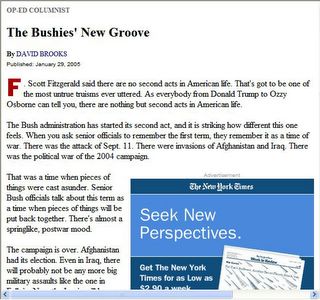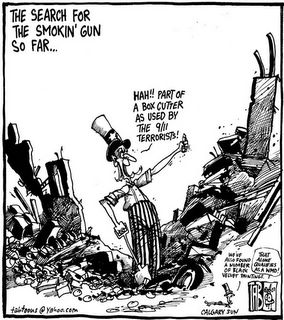

Replusive (Text at end of this Post)!




January 29, 2005
OP-ED COLUMNIST
The Bushies' New Groove
By DAVID BROOKS
. Scott Fitzgerald said there are no second acts in American life. That's got to be one of the most untrue truisms ever uttered. As everybody from Donald Trump to Ozzy Osborne can tell you, there are nothing but second acts in American life.
The Bush administration has started its second act, and it is striking how different this one feels. When you ask senior officials to remember the first term, they remember it as a time of war. There was the attack of Sept. 11. There were invasions of Afghanistan and Iraq. There was the political war of the 2004 campaign.
That was a time when pieces of things were cast asunder. Senior Bush officials talk about this term as a time when pieces of things will be put back together. There's almost a springlike, postwar mood.
The campaign is over. Afghanistan had its election. Even in Iraq, there will probably not be any more big military assaults like the one in Falluja. Now the Iraqis will be making most of the key decisions, and Americans will, with any luck, do more training and less fighting.
One of the effects of this new attitude is that the administration is less fixated upon the Middle East. There is a much broader global perspective. In candid, sprawling conversations, officials are much quicker to talk about Latin America, and the different challenges presented by the (bad) situation in Venezuela and the (promising) one in Brazil. There is more talk of our relationship with India. There is much more discussion of the need to repel China's efforts to reduce American influence in the Pacific.
The administration has certainly not forgotten the Middle East. Mahmoud Abbas is doing a great job, everybody says. There might be a cease-fire between Israel and the Palestinians next month. Senior officials understand that State should send somebody to monitor agreements between the two sides to prevent miscommunications. But there is a clear intent not to let the big dogs like Condoleezza Rice and Stephen Hadley get transfixed by the process.
The new mood has also brought a resurgence of soft-power thinking. Administration officials are trying to think big about what institutions can be used to implement the freedom agenda the president sketched out in his Inaugural Address.
When you ask exactly which institutions need to be created, they get more than a little vague, but you get a clear sense of their preferences. Bush folks have not developed any new love for the Security Council. Instead, they are much more interested in working with regional groups, like the Organization of American States.
Their favorite kinds of institutions are the kinds they created in response to the tsunami disaster: the kind with no permanent offices and no permanent staff, the kind that is created to address a discrete problem and then disappear when the problem is over. The phrase for this is coalitions of the willing. If you think the Iraq situation soured the Bush team on these sorts of coalitions, you're wrong.
The foreign policy of the Bush officials is beginning to sound more like compassionate conservatism all the time. To win the war of ideology against radical Islam, they want to put much more emphasis on global trade. This strikes me as unpromising; if trade could loosen up radical regimes, Saudi Arabia would be Switzerland. But they really mean it.
They also really mean it when they talk about getting education ministers more involved in global summits and radically transforming our public diplomacy. They mean it when they talk about the anti-AIDS program as a way to use humanitarian relief to build new government institutions and change the character of regimes.
There's so much soft-power talk in the Bush administration these days it would make Kofi Annan queasy.
But it's part of a real feeling of rebirth. For the moment, the State Department types are happy with their new secretary. I ran into a senior Pentagon official coming out of the State Department building - a metaphor for the reduced hostilities between those two agencies. It's hard now even to see a split, at least within the administration, between so-called realists and so-called neocons.
People are even tired of fighting with Europe. "Let's stop analyzing the relationship," somebody pleaded in a fit of exhaustion.
Whether this compassionate second-term agenda can really last is another question. Events in Iraq tomorrow and in Iran later on may make these days look like a sabbatical. But new beginnings are fun.
They beat old beginnings every time.
E-mail: dabrooks@nytimes.com
Copyright 2005 The New York Times Company | Home | Privacy Policy | Search | Corrections | RSS | Help | Back to Top
No comments:
Post a Comment